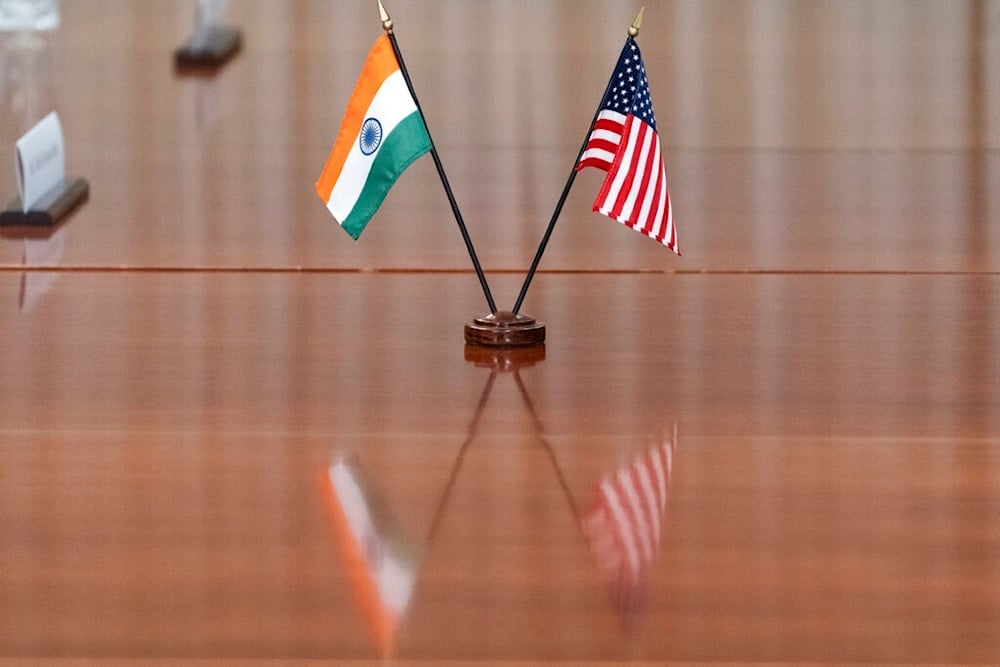Trump slaps $100k fee on H-1B visas, India warns of disruption
Trump's new $100,000 annual H-1B visa fee, paired with a $1 million residency scheme, has sparked alarm in India and among global tech firms over economic disruption, talent mobility, and immigration uncertainty.
-

The counties' flags are seen on the table during a meeting with India's Foreign Minister Subrahmanyam Jaishankar and Secretary of Defense Lloyd Austin at the Pentagon, Monday, Sept. 26, 2022, in Washington (AP Photo/Alex Brandon)
India's leading technology association voiced alarm on Saturday over a decision by US President Donald Trump to impose an annual $100,000 charge on H-1B work visas, a move that could reverberate across the global tech industry.
New Delhi's foreign ministry also criticized the measure, warning it would create "disruption" for the families of those who hold such visas.
Visa Fee Shock
The H-1B scheme permits American companies to employ foreign professionals with advanced skills, including engineers, programmers, and scientists, for an initial period of three years, renewable up to six. The United States issues 85,000 of these permits annually through a lottery system, and Indians consistently represent the majority, accounting for roughly three-quarters.
The National Association of Software and Service Companies (Nasscom) cautioned that the sudden fee could undermine "business continuity" and pointed to the lack of transition time. "A one-day deadline creates considerable uncertainty for businesses, professionals, and students across the world," the group said, adding: "Policy changes of this scale are best introduced with adequate transition periods, allowing organisations and individuals to plan effectively and minimise disruption."
Trump, announcing the measure in Washington on Friday, paired it with the launch of a $1 million residency "gold card" scheme he had previewed months earlier. "The main thing is, we're going to have great people coming in, and they're going to be paying," he said while signing the orders in the Oval Office.
Initially, the order created confusion among immigration lawyers and corporate employers, who feared the fee might apply even to existing visa holders re-entering the United States. Some companies urged employees abroad to return immediately. But on Saturday, a White House official clarified to Axios that the fee would apply only to new applicants, beginning with the next visa lottery cycle, not to current holders or renewals.
Skilled Talent Disruption
India's foreign ministry argued that the free flow of skilled professionals had boosted "technology development, innovation, economic growth, competitiveness and wealth creation" in both countries. It further noted that the new policy could have "humanitarian consequences by way of the disruption caused for families."
Major corporations that depend heavily on Indian employees are already taking precautions. JPMorgan advised staff on H-1B visas to remain inside the United States and avoid overseas travel until further guidance.
Some business leaders, including Elon Musk, have warned that targeting these visas risks harming American competitiveness. The United States, they argue, does not produce enough highly trained workers to fill crucial positions.
Commerce Secretary Howard Lutnick, who joined Trump at the Oval Office event, countered that "All the big companies are on board."
Immigration Crackdown Intensifies
Trump has sought to tighten the H-1B system since his first term, though earlier attempts were struck down in court. The latest measure comes amid a broader second-term clampdown on immigration, with the White House portraying the visa fee as a step to protect American jobs.
US approval rates for H-1B visas peaked in 2022 under President Joe Biden, while rejection rates were highest in 2018 during Trump’s first tenure. About 400,000 visas were approved in 2024, two-thirds of them renewals.
In addition to the $100,000 fee, Trump also unveiled an expedited residency option: $1 million for individuals or $2 million via corporate sponsorship. "I think it’s going to be tremendously successful," he said.
Other countries have begun weighing the implications. South Korea’s foreign ministry said it would "comprehensively assess the impact of these measures on the advancement of (South Korean) companies and professional talents into the US market and engage in necessary communication with the US." The statement followed the detention of hundreds of South Korean workers in a US immigration raid at a Hyundai-LG battery plant in Georgia earlier this month.
Read more: Trump expands visa vetting, halts foreign trucker permits

 4 Min Read
4 Min Read








